Saint of the Day
Looking at the Saints from the eyes of a saint.

St Anthony the Abbot
January 17
St. Francis de Sales preached a eulogy of St Anthony the Abbot, chosen by him as a protector of his interior desert. “And in this desert I want to remain alone with God, while in the midst of all the men and busyness that surrounds me.”
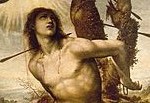
St Sebastian
January 20
St Francis de Sales had a very special veneration for St Sebastian, patron of the castle of Sales. He generally preached there on January 20. Once, referring to the arrows which are the insignia of St Sebastian, he said, ” The bishop’s cross must be like the insignia of this saint, who is represented with piercing arrows all over his body, to announce to all that he is a servant of Jesus Christ.”
Animated by this sentiment, instead of the cape and scapular, he prescribed for his Daughters of the Visitation that they should bear a silver cross on which were the names of Jesus and Mary so that everyone would know the Visitandines belong to Jesus Christ Crucified.

St Thomas Aquinas
January 28
“The great St. Thomas, who had one of the loftiest minds possible, when he formed any opinion,supported it with the most weighty arguments that he could bring forward. Nevertheless, if he came in contact with any one who did not approve of what he had decided to be right, or had contradicted it, he neither disputed with him nor was offended by his action, but took all in good part.He thereby showed that he had no love for his own opinion, though he could not abandon it ; he left the matter alone, to be approved or disapproved by others as they pleased. Having done his duty,he troubled himself no more about the subject.”
Source: Spiritual Conference 14

St Frances of Rome
March 9
God is innocent to the innocent, good to the good, cordial to the cordial, tender towards the tender, and his love often makes him do acts of a sacred and holy fondness towards souls who, out of an amorous purity and simplicity, make themselves as little children with him.
Upon a day S. Frances was reciting Our Lady’s Office, and, as it commonly happens that if there is but one affair in the whole day, it presses most at time of prayer, this holy lady was called away by her husband for some household matter, and four sundry times thinking to take up again the thread of her Office, she was called from it again, and constrained to interrupt the same verse, till this blessed affair, for which they had so importunately interrupted her prayer, being finished at last, when she returned to her Office she found the verse, so often left by obedience and so often recommenced by devotion, all written in fair golden letters, which her devout companion, Madam Vannocia swore she saw the dear Angel-Guardian of the Saint writing, as S. Paul afterwards revealed to the Saint herself.
What sweetness, Theotimus, of this heavenly spouse towards this sweet and faithful lover! But meantime you see that necessary employments, according to each one’s vocation, do not diminish Divine love, but increase it, and gild, as it were, the work of devotion.
Source: Treatise on the Love of God, Book 12
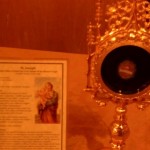
St Joseph
March 19
The Spiritual Conference of St. Francis de Sales, entitled, “The Virtues of St. Joseph”, or Conference 19, spell out quite clearly the characteristics the Founder of the Visitation Order wanted to emphasize in this Patron of the Monasteries.
St. Francis wrote, “valour, constancy, and strength..virtues which existed in our saint in a very eminent degree. It is certainly with very good reason that St. Joseph is said to resemble the palm-tree, for he was always very valiant, constant, and persevering.
Now our glorious St. Joseph was endowed with all these virtues, and practised them marvellously well. With regard to his constancy, how did he show it when, seeing our Lady with child and not knowing how that could be, (O God, what distress, what trouble of mind did he not suffer!) nevertheless he does not complain, he is not unkind, nor less gracious towards his spouse, he does not illtreat her on that account, but remains as gentle and as respectful to her as he had ever been.
But what valour and what strength does he not show in the victory that he gained over the two great enemies of man, the devil and the world! And that by the exact practice of humility, as we have observed in the whole course of his life.
With regard to perseverance against that interior enemy, the weariness or distress that comes over us from the continuation of abject, humiliating and painful things, of misfortunes if we must so speak, or from the various accidents that happen to. us; Oh! how greatly was this Saint tried by God, and by men even in his journey. The Angel commands him to set out quickly, and to take our Lady and her most dear Son into Egypt; and behold, he sets out at once without saying a word. He does not inquire, “”Where shall I go? What road shall I take? How shall we find food? Who will receive us?” He sets out probably with his tools on his back, in order to gain in the sweat of his brow his poor bread and that of his family. Oh ! how much he must have felt that distress of which we are speaking, seeing that the Angel had not even told him how long he was to remain there! He could not establish himself in any permanent home, not knowing when the Angel might command him to return.
If St. Paul so much admired the obedience of Abraham, in that when God had not told him which way he should go, Abraham did not ask, Lord, Thou tellest me to go out, but tell me then whether it is to be by the south or by the east gate but he set out immediately, and went as the Spirit of God conducted him; how admirable is this perfect obedience of St. Joseph . The Angel did not tell him what time he was to remain in Egypt, and he did not inquire; he dwelt there for the space of five years, as most persons think, without inquiring about his return, being sure that He who had commanded him to go, would again command him when he had to return, and he was always ready to obey.
I leave you to imagine how much St. Joseph must hare longed to return… The anxiety of not knowing when he should go away, must no doubt have greatly afflicted and tormented his poor heart; nevertheless he remained always the same, always sweet, tranquil, and persevering in his submission to the good pleasure of God, by which he let himself be entirely guided; for as he was just, his will was always submissive, united, and conformed to that of God. To be just is nothing else but to be perfectly united to the will of God, and to be conformed to it in all events prosperous or adverse.
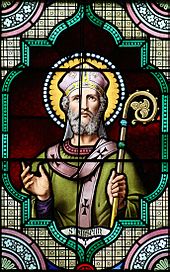
St Anselm
April 21
We are told that Saint Anselm of Canterbury, (our mountains may glory in being his birthplace) was much given to such (holy) thoughts. On one occasion a hunted hare took refuge from imminent death beneath the Bishop’s horse, the hounds clamouring round, but not daring to drag it from its asylum, whereat his attendants began to laugh; but the great Anselm wept, saying, “You may laugh forsooth, but to the poor hunted beast it is no laughing matter; even so the soul which has been led astray in all manner of sin finds a host of enemies waiting at its last hour to devour it, and terrified, knows not where to seek a refuge, and if it can find none, its enemies laugh and rejoice.” And so he went on his way, sighing.
Introduction to Devout Life Pt. 2 Chap. 13

St Catherine of Siena
April 29
St. Catherine of Sienna makes a beautiful simile on this subject.'” ” If,” she says, ” you take a glass and fill it in a fountain, and if you drink from this glass without taking it out of the fountain,
you may drink as much as you like, the glass will never become empty ; but if you take it out of the fountain, when you have drunk the glass will be empty.” So it is with friendships; if we never
withdraw them from their source, they never dry up.
Source: Spiritual Conferences, Chapter 7
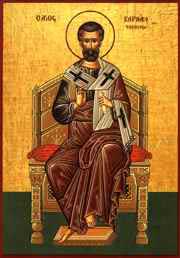
St Barnabas
June 11
S. Matthew’s Gospel was actually found upon the heart of the dead S. Barnabas, written with his own hand.
Wherefore in the ancient councils, in the midst of the whole assembly of Bishops, there was erected a high throne, and upon it was placed the book of the holy Gospels, which represented the person of our Saviour, King, Doctor, Director, Spirit and sole Heart of the Councils, and of the whole Church: so much did they reverence the signification of God’s will expressed in that divine book.
Treatise on the Love of God ,Book 8 Chapter 3

St Bonaventure
July 15
From Treatise on Love of God Book, 4 chapter 7
“Wherefore I have always considered that the learned modesty and most wise humility of the seraphic Doctor S. Bonaventure were greatly to be admired and loved, in the discourse which he makes of the reason why divine providence ordains the elect to eternal life. “Perhaps,” says he, “it is by a foresight of the good works which will be done by him that is drawn, insomuch as they proceed in some sort from the will but distinctly to declare which good works being foreseen move God’s will, I am not able, nor will I make inquiry thereupon and there is no other reason than some sort of congruity, so that we might assign one while it might be another. Wherefore we cannot with assurance point out the true reason nor the true motive of God’s will in this: for as S. Augustine says: ‘Although the truth of it is most certain, yet is it far removed from our thoughts.’ So that we can say nothing assuredly of it unless by the revelation of him who knows all things. And whereas it was not expedient for our salvation that we should have knowledge of these secrets, but on the contrary, it was more profitable that we should be ignorant of them, to keep us in humility, God would not reveal them, yea the holy Apostle did not dare to inquire about them, but testified the insufficiency of our understanding in this matter when he cried out: O the depth of the riches of the wisdom and of the knowledge of God!”
Could one speak more holily, Theotimus, of so holy a mystery? Indeed these are the words of a most saintly and prudent Doctor of the Church.”

St Mary Magdalen
July 22
From Treatise on the Love of God, Book 6 Chapter 7
All Magdalen’s affections, and all her thoughts, were scattered about the sepulchre of her Saviour, whom she went seeking hither and thither, and though she had found him, and he spoke to her, yet leaves she them dispersed, because she does not perceive his presence; but as soon as he had called her by her name, see how she gathers herself together and entirely attaches herself to his feet: one only word puts her into recollection.
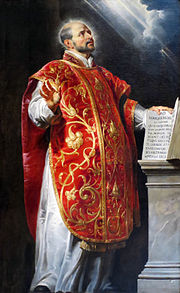
St Ignatius of Loyola
July 31
(S.) Ignatius of Loyola having with such pains put on foot the Company of the name of Jesus, from which he saw so many fair fruits and foresaw many more in the time to come, had yet the nobility of soul to promise himself that though he should see it dissolved (which would be the bitterest pain that could befall him), within half an hour afterwards he would be stayed and tranquil in the will of God.

St Bernard
August 20
St Francis de Sales often looked toward St Bernard as a model. He had many references to him in his Introduction to the Devout Life, and one whole chapter was devoted to him in regards to an example of prayer.
From :Part 4 chapter 23 of Christian Classics Ethereal Library
“LET me illustrate what I have said by an anecdote of Saint Bernard.
It is common to most beginners in God’s Service, being as yet inexperienced in the fluctuations of grace and in spiritual vicissitudes, that when they lose the glow of sensible devotion, and the first fascinating lights which led them in their first steps towards God, they lose heart, and fall into depression and discouragement. Those who are practised in the matter say that it is because our human nature cannot bear a prolonged deprivation of some kind of satisfaction, either celestial or earthly; and so as souls, which have been raised beyond their natural level by a taste of superior joys, readily renounce visible delights when the higher joys are taken away, as well as those more earthly pleasures, they, not being yet trained to a patient waiting for the true sunshine, fancy that there is no light either in heaven or earth, but that they are plunged in perpetual darkness. They are just like newly-weaned babes, who fret and languish for want of the breast, and are a weariness to every one, especially to themselves.
Just so it fell out with a certain Geoffroy de Peronne, a member of S. Bernard’s community, newly dedicated to God’s Service, during a journey which he and some others were making. He became suddenly dry, deprived of all consolations, and amid his interior darkness he began to think of the friends and relations he had parted from, and of his worldly pursuits and interests, until the temptation grew so urgent that his outward aspect betrayed it, and one of those most in his confidence perceiving that he was sorely troubled, accosted him tenderly, asking him secretly, “What means this, Geoffroy? and what makes thee, contrary to thy wont, so pensive and sad?” Whereupon Geoffroy, sighing heavily, made answer, “Woe is me, my brother, never again in my life shall I be glad!”
The other was moved to pity by these words, and in his fraternal love he hastened to tell it all to their common father S. Bernard, and he, realising the danger, went into the nearest church to pray for Geoffroy, who meanwhile cast himself down in despair, and, resting his head on a stone, fell asleep. After a while both rose up, the one full of grace won by prayer, the other from his sleep, with so peaceful and gladsome a countenance, that his friend, marvelling to see so great and unexpected a change, could not refrain from gently reproaching him for his recent words. Thereupon Geoffroy answered, “If just now I told thee that I should never more be glad, so now I promise thee I will never more be sad!” Such was the result of this devout man’s temptation; but from this history I would have you observe:—
1. That God is wont to give some foretaste of His heavenly joys to beginners in His Service, the better to wean them from earthly pleasures, and to encourage them in seeking His Divine Love, even as a mother attracts her babe to suck by means of honey.
2. That nevertheless it is the same Good God Who sometimes in His Wisdom deprives us of the milk and honey of His consolations, in order that we may learn to eat the dry substantial bread of a vigorous devotion, trained by means of temptations and trials.
3. That sometimes very grievous temptations arise out of dryness and barrenness, and that at such times these temptations must be stedfastly resisted, inasmuch as they are not of God; but the dryness must be patiently endured, because He sends that to prove us. 4. That we must never grow discouraged amid our inward trials, nor say, like Geoffroy, “I shall never be glad;” but through the darkness we must look for light; and in like manner, in the brightest spiritual sunshine, we must not presume to say, “I shall never be sad.” Rather we must remember the saying of the Wise Man, “In the day of prosperity remember the evil.” It behoves us to hope amid trials, and to fear in prosperity, and in both circumstances always to be humble.
5. That it is a sovereign remedy to open our grief to some spiritual friend able to assist us.
And, in conclusion, I would observe that here, as everywhere, our Gracious God and our great Enemy are in conflict, for by means of these trials God would bring us to great purity of heart, to an entire renunciation of self-interest in all concerning His Service, and a perfect casting aside of self-seeking; but the Evil One seeks to use our troubles to our discouragement, so as to turn us back to sensual pleasures, and to make us a weariness to ourselves and others, in order to injure true devotion. But if you will give heed to the above instructions you will advance greatly towards perfection amid such interior trials, concerning which I have yet one word to say. Sometimes revulsions and dryness and incapacity proceed from bodily indisposition, as when excessive watching, 1 fasting, or overwork produce weariness, lassitude, heaviness, and the like; which, while wholly caused by the body, interfere greatly with the soul, so intimately are they linked together. When this is the case, you must always remember to make marked acts of virtue with your higher will, for, although your whole soul may seem to be sunk in drowsy weariness, such mental efforts are acceptable to God. At such a time you may say with the Bride of the Canticles, “I sleep, but my heart waketh.” And, as I have already said, if there is less enjoyment in such efforts, there is more virtue and merit. But the best remedy under the last-named circumstances is to reinvigorate the body by some lawful recreation and solace.
S. Francis enjoined his religious to use such moderation in their labours as never to impair the fervour of their minds. And speaking of that great Saint, he was himself once attacked by such deep depression of mind that he could not conceal it; if he sought to associate with his religious he was unable to talk; if he kept apart he only grew worse; abstinence and maceration of the flesh overwhelmed him, and he found no comfort in prayer. For two years he continued in this state, as though altogether forsaken of God, but after humbly enduring the heavy storm, his Saviour restored him to a happy calm quite suddenly.
From this we should learn that God’s greatest servants are liable to such trials, so that less worthy people should not be surprised if they experience the same.”

St Louis
August 25
S. Louis, a monarch unrivaled in time of peace or war, who was most diligent in the administration of justice and in ruling his country, nevertheless was wont to hear two masses daily, to say vespers and compline with his chaplain, and to make his meditation daily. He used to visit the hospitals every Friday, was regular at confession, took the discipline, often attended sermons and spiritual conferences, and withal he never lost any opportunity of promoting the public welfare, and his court was more flourishing and notable than that of any of his predecessors.”
(Introduction to a Devout Life, Part 5, Chap.17)

St Monica (The Visitandine "Great Grandmother"
August 27
It is well known among Visitandines that St. Augustine, whose monastic rule for religious life we follow, is often called our”grandfather” as our Holy Father, St. Francis de Sales, chose St Augustine as a model for our community living.
So, therefore our relationship to St Augustine’s mother, St. Monica, makes us virtual “great-granddaughers”!
St. Francis de Sales reflected on St. Monica in some of his writings.
He says of her in the Introduction to the Devout Life, Part 3, Chapter 19, that “St. Augustine testifies that St. Ambrose loved St. Monica solely for the rare virtues he saw in her and that she in turn loved him as an angel of God.”
St Francis de Sales also wrote, 400 years ago, a very timely paragraph about St Monica’s motherhood:
“When St. Monica was about to give birth to the great St. Augustine, she dedicated him by repeated acts of oblation to the Christian religion and the service of God’s glory. He testifies to this and says that “he had already tasted God’s salt within his mother’s womb.”
“The story contains a great lesson, for it tells Christian women to offer up to God’s Majesty the fruit of their wombs even before it comes into the world. At such times, God, who accepts the offerings of a humble and willing heart, is wont to inspire a mother’s affections.”
Source: St. Francis de Sales, Introduction to the Devout Life, Part 3, Chapter 38, p, 224, Ryan’s edition
St. Monica, pray for us!
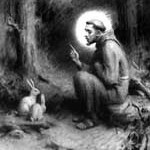
St Francis of Assisi
October 4
Today we celebrate the life and legacy of St. Francis of Assisi: religious and mendicant. St. Francis of Assisi was Francis de Sales’ namesake and patron. No surprise, then, that Francis de Sales held Assisi in great esteem and mentioned him many times throughout his writings. We find one such example in the Treatise on the Love of God. Francis de Sales observed:
“A heart seized and urged on by a desire to praise God’s goodness beyond its own abilities after many such efforts often goes outside itself so as to enlist all creatures to help it in its designs. We see how the three children in the furnace do this in that wonderful canticle of blessings by which they arouse up all things in heaven on the earth and under the earth to render thanks to the eternal God by supremely praising and blessing him. So, too, the glorious Psalmist, moved through-and-through by a disordered but holy passion that bore him on to praise God, proceeds without order. In all haste he calls on angels, fishes, mountains, waters, dragons, birds, serpents, fire, hail, and mist, gathering together by his desires all creatures so that they may conspire devoutly to magnify their creator. Some of them in themselves celebrate God’s praise; others provide matter for praising him by their various wonderful properties which manifest the grandeur of their maker. Therefore after this divine, royal Psalmist had composed a great number of the psalms with the inscription ‘Praise God’ and had gone through a vast variety of ways and instruments suitable to celebrate the praise of such eternal goodness, finally, as if failing for lack of breath, he concludes his whole scared psalmody with this cry, ‘Let every spirit praise the Lord,’ that is, ‘Let all that lives live and breathe only to bless the creator…’ Thus did the great St. Francis [of Assisi] chant the ‘Canticle of the Sun’ and a hundred other excellent benedictions to invoke creatures to come and aid his heart, languishing because he could not praise his soul’s dear Savior as he wished…”
How grateful are we for God’s goodness in our regard? How thankful are we for all the good things that God has done – and continues to do – for us? How might we make our lives convincing canticles or benedictions of praise to the eternal God who showers us with so many blessings?
From: Spirituality Matters, 2011
Fr Michael Murray OSFS

St Theresa of Avila
October 15
St Theresa of Avila: St. Francis makes reference to St Teresa of Avila’s opinion in the Treatise, which we share as another way of joining in the Carmelites’ celebration of her birth this year:
“The Blessed Mother (S.) Teresa of Jesus, also, in good truth, a quite angelic virgin, speaking of the prayer of quiet, says these words:—“There are divers souls who come up to this perfection, but those who pass beyond are a very small number: I know not the cause of it, certainly the fault is not on God’s side, for since his divine majesty aids us and gives us the grace to arrive at this point, I believe that he would not fail to give us still more if it were not for our fault, and the impediment which we on our part place.” Let us therefore, Theotimus, be attentive to advance in the love which we owe to God, for that which he bears us will never fail us.”
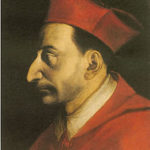
St Charles Borromeo
November 4
From: Treatise on the Love of God, Book 12, Chap 9
Behold the great S. Charles, when the plague attacked his diocese. He lifted up his heart to God, and reflected attentively that in the eternity of Divine Providence, this scourge was prepared and determined for his flock, and that the same Providence had ordained that in this their scourge he should take a most tender care to serve, solace and cordially assist the afflicted, since in this occurrence he found himself the ghostly father, pastor and bishop of that province.
Whereupon, representing to himself the greatness of the pains, toils and hazards which it would be incumbent on him to undergo in that behalf, he immolated himself in spirit to God’s good-pleasure, and tenderly kissing this his cross, he cried from the bottom of his heart, in imitation of S. Andrew: “I salute thee, O precious cross, I salute thee, O blessed tribulation! O holy affliction, how delightful thou art, since thou didst issue from the loving breast of this Father of eternal mercy, who willed thee from all eternity, and ordained thee for my dear people and me! O cross, my heart wills thee, since the heart of my God has willed thee; O cross, my soul cherishes and embraces thee, with its whole affection!”

St Martin of Tours
November 11
From: Treatise on the Love of God, Book 9 Chap 4
The great Bishop S. Martin, who having come to the end of his life, pressed with an extreme desire to go to his God, did yet testify that he would most willingly remain amongst the labours of his charge, for the good of his flock, as if after having sung this canticle: How lovely are thy tabernacles, O Lord of hosts! My soul longeth and fainteth for the courts of the Lord. My heart and my flesh have rejoiced in the living God:(2) – he went on to make this exclamation: “Yet O Lord, if I am still necessary for the salvation of your people, I refuse not the labour, your will be done.”
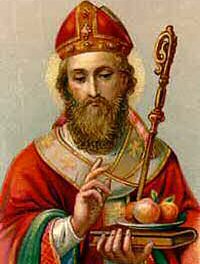
St Nicolas
December 6
St Francis de Sales had a deep devotion to the great St. Nicholas and generally preached on his feast day. In 1619 he spoke with much fervor from Scripture ” “For the needy shall not always be forgotten, nor shall the hope of the afflicted forever perish” Ps 9:19
He applied these words to the life of St Nicholas, and his large congregation promised to have a greater devotion to him.
St Francis de Sales was miraculously saved after intercession to St Nick on the sea, on his first trip to Italy. On two other occasions he was endangered on the Lake of Geneva and on the Rhone and St Nicholas’ intercession prevented disaster.
Source: Every Day with St Francis de Sales by Francis Klauder, SDB
St Ambrose
December 7
St. Francis de Sales preached about the endearing qualities of St. Ambrose. Visitandines take note because it was St. Ambrose who helped to convert St. Augustine, whose Rule we follow in the Visitation Order.
St. Francis de Sales said: “ I would like to talk to you about St Ambrose, Archbishop of Milan, whose feast we are about to celebrate..We should have a particular veneration for him because he was the spiritual father of St. Augustine. He was a lovable man, full of charity and zeal for the glory of God, and a vigilant pastor; in a word, a man enriched with every virtue, very careful in carrying out all his priestly duties.
Although gentle and forgiving by nature, all the same he did not fail to show firmness in correcting those who were guilty without letting himself be deterred by other considerations. A man of God is recognized by his works.”
Source: Sermon 38